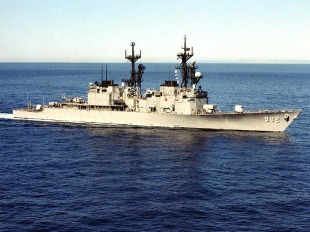Destroyer USS Fletcher (DD-992)
Basic information
Ship measurements
Machine
- 4 * General Electric LM2500 gas turbines
- 2 * shafts, 80,000 shp (60 MW)
Personnel
Combat assets
- AN/SPS-40 air search radar
- AN/SPG-60 fire control radar
- AN/SPS-55 surface search radar
- AN/SPQ-9 gun fire control radar
- Mark 23 TAS automatic detection and tracking radar
- AN/SPS-65 Missile fire control radar
- AN/SQS-53 bow mounted Active sonar
- AN/SQR-19 TACTAS towed array Passive sonar
- Naval Tactical Data System
- AN/SLQ-32 Electronic Warfare System
- AN/SLQ-25 Nixie Torpedo Countermeasures
- Mark 36 SRBOC Decoy Launching System
- AN/SLQ-49 Inflatable Decoys
- 2 * 5 in (127 mm) 54 calibre Mark 45 dual purpose guns
- 2 * 20 mm Phalanx CIWS Mark 15 guns
- 1 * 8 cell ASROC launcher (removed)
- 1 * 8 cell NATO Sea Sparrow Mark 29 missile launcher
- 2 * quadruple Harpoon missile canisters
- 2 * Mark 32 triple 12.75 in (324 mm) torpedo tubes (Mk 46 torpedoes)
- 1 * 61 cell Mk 41 VLS launcher for Tomahawk missiles
- 1 * 21 cell RIM-116 Rolling Airframe Missile
- 2 * Sikorsky SH-60 Seahawk LAMPS III helicopters
The USS Fletcher (DD-992), the thirtieth destroyer of the Spruance-class, was among the initial set of United States Navy surface vessels powered by gas turbines. Commissioned in July 1980, it primarily operated in the western and southern Pacific regions but also ventured to the Indian Ocean and Persian Gulf. This ship marked the second in the U.S. Navy with the name «Fletcher,» honoring Admiral Frank Jack Fletcher. Following decommissioning in 2004, it was utilized in a torpedo test exercise and sunk in 2008.
Constructed and manufactured by Ingalls Shipyards of Litton Industries in Pascagoula, Mississippi, Fletcher belonged to the primary group of U.S. Navy surface ships employing gas turbine engines. Four General Electric LM2500 gas turbines, marine adaptations of those in DC-10 aircraft, propelled the vessel at speeds surpassing 30 knots (56 km/h). Twin controllable reversible pitch propellers granted Fletcher a distinctive level of maneuverability, unparalleled among warships of its size.
Upon commissioning in July 1980, Fletcher promptly joined the Pacific Fleet. From 1982 onward, it undertook regular deployments to the western and southern Pacific regions, some extending into the Indian Ocean and Persian Gulf territories. Between 1994 and 1995, the ship underwent modernization, incorporating the vertical launch system, significantly expanding its capabilities.
A remarkably adaptable multi-purpose destroyer, Fletcher operated autonomously or in conjunction with Amphibious or Carrier Task Forces. Its primary objective encompassed offensive operations in Strike Warfare or Anti-Submarine Warfare (ASW) roles. Equipped with the Tomahawk Weapons Systems, Fletcher possessed long-range cruise missile capabilities for tactical strike operations. The AN/SQR-19 Tactical Towed Array Sonar (TACTAS) served as the ship's primary passive ASW sensor, complemented by an advanced underwater detection and fire control system combining active sonar and the Mk 116 Underwater Fire Control System. The Naval Tactical Data System (NTDS) enhanced the ship's ability to process target information swiftly and accurately. Integration of the ship's digital gun fire control system in the NTDS facilitated rapid responses in shore bombardment, Anti-Surface, and Anti-Aircraft Warfare scenarios.
Originally equipped with an 8-tube ASROC launcher, Fletcher underwent upgrades with a sixty-one cell Mk 41 Vertical Launching System to fire Tomahawk Land Attack Missiles (TLAMs) and Anti-Submarine Rockets (ASROCs). Its arsenal included two Mk 45 lightweight 5-inch guns, two triple Mk 32 torpedo tubes, and facilities for LAMPS helicopters. Defense armaments comprised the NATO Sea Sparrow Missile System, Harpoon Weapon System, two Mk 15 (PHALANX) 20 mm Close-In Weapons System, SRBOC chaff, and topside armor. The AN/SLQ-32 countermeasures set provided additional defense against anti-ship missiles through active electronic countermeasures.
Ensuring crew comfort and habitability formed an integral aspect of the design. Berthing compartments offered ample space, while the ship incorporated amenities uncommon on other destroyers, including a crew's gymnasium and a makeshift library housing several hundred fiction novels. Despite its size, Fletcher's high degree of automation allowed a crew of 24 officers and 296 enlisted personnel to operate the ship.
The Fletcher participated in significant military exercises and deployments, including missions to Central America and the Indian Ocean. Its operational history showcased its adaptability and role in various global operations. Ultimately, after being decommissioned in 2004, it met its fate in a torpedo test exercise in 2008, orchestrated as part of its final chapter in naval service.
- Comments
 en
en ru
ru uk
uk




 United States Navy
United States Navy Ingalls Shipbuilding
Ingalls Shipbuilding